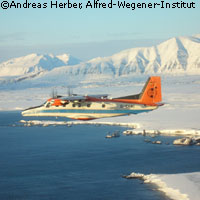Arctic air cleaner than usual, say researchers
The air over the Arctic is much cleaner this spring than in previous years, according to early results from an international research project which is studying the atmosphere over the Norwegian island of Spitsbergen. Scientists from nine countries are in the Arctic as part of the ASTAR 2007 (Arctic Study of Tropospheric Aerosol, Clouds and Radiation) project, which aims to describe the Arctic atmosphere in spring. The project is lead by the Alfred Wegener Institute for Polar and Marine Research and the German Aerospace Centre. The project partners are collecting data on the amount and distribution of aerosols in the Arctic atmosphere with special research planes and ground measurements. Early results show that the air above the Arctic is relatively clean this year, although remnants of pollution from central and Eastern Europe have been detected at altitudes of a few kilometres. The Arctic is particularly susceptible to pollution by aerosols in the winter and spring. This so-called Arctic haze is transported to the region from northern mid-latitudes, where it is produced by fossil-fuel burning and industrial and agricultural processes. Aerosol droplets in the atmosphere have a direct impact on the climate by either scattering or absorbing solar radiation. They also have an indirect impact on the climate when they act as condensation nuclei and cause clouds to form. By studying the aerosols in the Arctic atmosphere, the researchers hope to gain a better understanding of these processes. Their work will also be valuable in validating data from the Cloud-Aerosol Lidar and Infrared Pathfinder Satellite Observation (CALIPSO) satellite, which is currently on a polar orbit and has instruments designed to measure the impact of aerosols on the climate.

